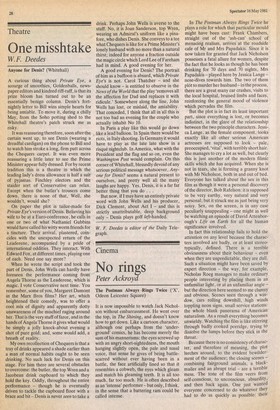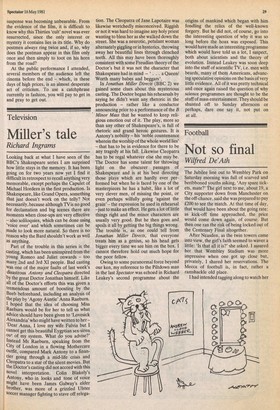Cinema
No rings
Peter Ackroyd The Postman Always .Rings Twice ('X', Odeon Leicester Square) It is now impossible to watch Jack Nicholson without embarrassment. He went over the top, in The Shining, and doesn't know how to get down. Like a cartoon character, although one perhaps from the 'underground' comics, he has become merely the sum of his mannerisms: the eyes screwed up with an angry short-sightedness, the mouth hanging slightly open, the pale and nasal voice, that sense he gives of being battlescarred without ever having been in a battle, the face artificially lined so that it resembles a cobweb, the eyes which gleam and match his gleaming teeth. It is all too much, far too much. He is often described as an Intense' performer — but only, I think, in the sense that a battering ram could be called intense. In The Postman Always Rings Twice he plays a role for which that particular mould might have been cast: Frank Chambers, straight out of the `ash-can' school of menacing realism, arrives at the roadside cafe of Mr and Mrs Papadakis, Since it is now taken for granted that Jack Nicholson possesses a fatal allure for women, despite the fact that he looks as though he has been drinking for 70 days and 70 nights, Mrs Papadakis — played here by Jessica Lange — nose-dives towards him. The two of them plot to murder her husband— in the process, there are a great many car crashes, visits to the local hospital, bruised limbs and faces, reinforcing the general mood of violence which pervades the film. But the plot is in fact its least important part, since everything is lost, or becomes indistinct, in the glare of the relationship between the two principle characters. Jessica Lange, as the female component, looks exactly like all other serious American actresses are supposed to look — pale, preoccupied, `vital', with terribly short hair. She manages to cry a lot as well, but clearly this is just another of the modern filmic skills which she has acquired. When she is not in tears, she is forming a granny knot with Mr Nicholson, both in and out of bed.•Everyone has talked about the sex in this film as though it were a personal discovery of the director, Bob Rafelson: it is supposed to be very earthy, very natural and very personal; but it struck me as just being very noisy. Sex, on the screen, is in any case peculiarly unappealing — one might as well be watching an episode of David Attenborough's Life on Earth for all the human significance involved.
In fact this relationship fails to hold the attention on any level because the characters involved are badly, or at least stereotypically, defined, There is a terrible obviousness about their behaviour — even when they are unpredictable, they are dull. Such a situation might have been saved by expert direction — the way, for example, Nicholas Roeg manages to make ordinary people interesting by placing them in an unfamiliar light, or at an unfamiliar angle — but the direction here seemed to me clumsy and obvious. Scenes seen through a window, cars rolling downhill, high winds toppling neon signs, small service stations: the whole blank panorama of American naturalism. As a result everything becomes unwieldy. Watching the film is like stirrring through badly cooked porridge, trying to dissolve the lumps before they stick in the throat.
Because there is no consistency of character, and therefore of meaning, the plot lurches around, to the evident bewilder ment of the audience; the closing scenes — combining fairground animals, a black mailer and an abrupt trial — are a terrible mess. •The tone of the film veers from self-conscious, to unconscious, absurdity, and then back again. One just wanted everyone concerned to do whatever they had to do as quickly as possible: their suspense was becoming unbearable. From the evidence of the film, it is difficult to know why this Thirties 'cult' novel was ever resurrected, since the only interest or mystery it contains lies in its title. Why do postmen always ring twice and, if so, why does the postman appear in this film only once and then simply to toot on his horn from the road?
At the public performance I attended, several members of the audience left the cinema before the end — which, in these days of high prices, is an almost desperate act of criticism. To use a catchphrase currently in fashion, you will pay to get in and pray to get out.











































 Previous page
Previous page